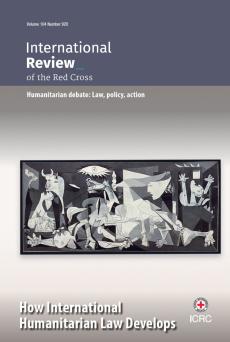IRRC No. 920-921 How International Humanitarian Law Develops
32 articles
“How does international humanitarian law (IHL) develop?” is a question, seemingly simple, yet more easily asked than answered. It touches upon the history of IHL, its current status and future prospects. Is it developed only by States? What is the role of non-state actors? Is it a normative movement starting in the mid-19th century, or have such rules always been part of culture and religions since time immemorial? Is IHL limited to the formally binding sources of treaties and customary law? If not, what do we make of the various non-binding norms in IHL and how “non-binding” are they really, if they can even be considered law to begin with? Finally: how to assess the trend of the last few decades in which such non-binding norms have become in many instances the preferred instrument for States to move forward in terms of IHL development? This edition examines these matters from the angle of the past, present and future of IHL development.

